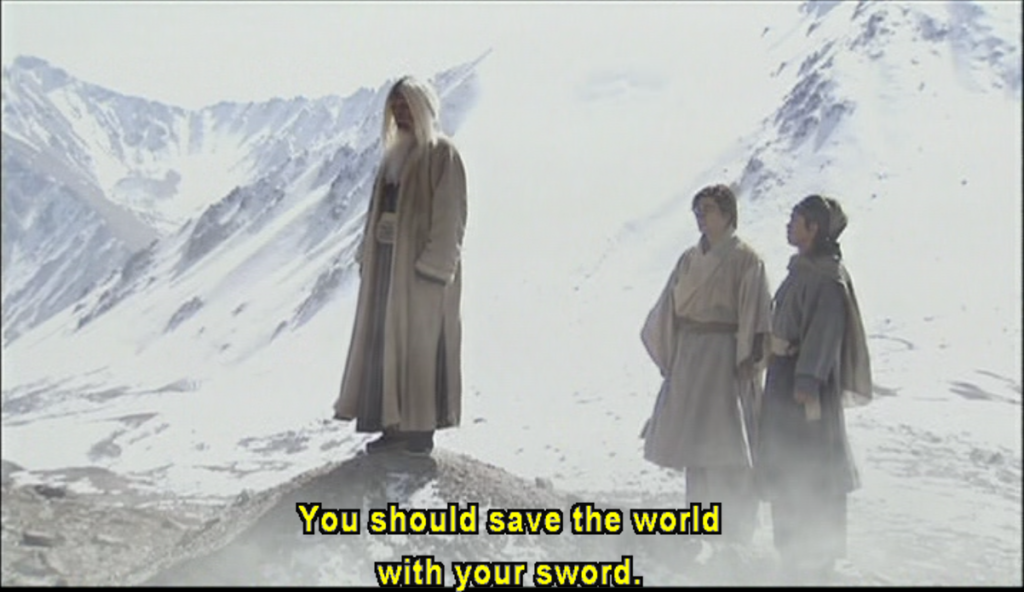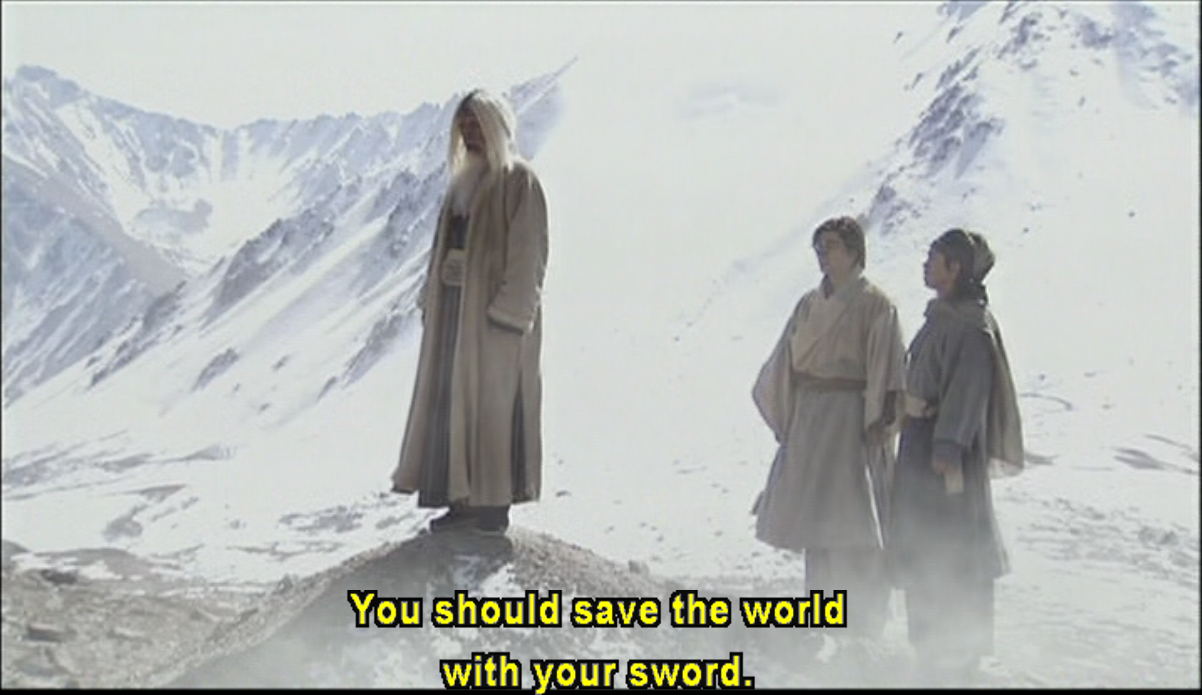TV Review: Seven Swordsmen aka “Seven Swords Descend from Mount Heaven”
In 17th Century China, the Qing Dynasty now rules where once the Ming Dynasty did. Many Han resent their new Manchu overlords and pockets of rebellion are everywhere. To help quell the resistance, the Qing have banned the practice of martial arts by ordinary citizens. The Red Spear Society strongly objects to this restriction. A particular stronghold of the Red Spears is Martial Village, and it has reached the government’s ears that Little King Lu, the last rightful heir to the Ming, is hidden there. Thus the Imperial army is poised to attack the village.

The wandering swordsman known as Fu decides to help the people of Martial Village. He takes two of their people with him to see Master Shadowglow (Ma Jingwu), a hermit who lives on Mount Heaven with his four sword training disciples. After due consideration, Master Shadowglow allows his disciples to join Fu’s cause, and equips the seven warriors with seven special swords. The “Seven Swords” pledge to remain united to achieve their mutual goals.
Despite their combined powers, the seven swordsmen are unable to defeat the entire army, but are able to get Martial Village evacuated with minimal loss of life. They relocate to a cave system known to Fu, but an Imperial spy in the Red Spear Society manages to sow discord and eventually give away their location. In the ensuing battle/escape, the Seven Swords are separated, not to fully reunite until much later, as they follow their individual roads.
This 2006 television series draws on the same novels as the 2005 movie Seven Swords. Those who’ve seen that movie will find the first portion of the series very familiar, particularly the bits with General Fire-wind and Green Pearl. Apparently the original idea to make a series of movies fell through, so it was done as a television series instead, only to be cut somewhat short at 39 episodes. Let’s look at each of the swordsmen.
Fu Qingzhu (Yu Chenghui): Usually addressed as “Senior Fu”, this elderly man was originally a government executioner under the previous Ming Dynasty. He killed hundreds without question under the corrupt government’s orders until Master Shadowglow gave him a wake-up call that also shattered his original sword. He immediately resigned his post and went into seclusion to reconsider his ways, only returning now that he sees that the Qing Dynasty is just as oppressive as the one he served. Fu wields “Unlearn”, his repaired and refined original sword, and refrains from killing as much as possible, using pressure points to disable opponents instead. He’s the leader and strategist of the Seven Swords, and the most likely to discuss philosophy with opponents during battle.
Chu Zhaonan (Vincent Zhao): Usually addressed as “First Brother Chu.” The first of Master Shadowglow’s disciples to be recruited, he’s a former aristocrat fallen on hard times. He’s considered to be the top swordsman in the group by sheer talent, and wields the Dragon sword, supposedly the most powerful sword in the world. He has a torrid but tragic love affair with exotic (Korean) dancer Green Pearl (Edell Aidai). In the process, he attracts the attention of main villain Duo Geduo (Ray Lui) who wants to recruit either him or his Dragon sword and is not too picky about which. Between his pride and Duo’s machinations, Chu keeps killing people he should not have done, and becomes alienated from his nominal allies and his fellow Swords.
Yang Yuncong (Wang Xuebing): Usually addressed as “Second Brother Yang.” A straightforward person who wields the Transience sword and acts according to his conscience, Yang is falsely accused of being a traitor to the Red Spear Society thanks to the Imperial spy. Fleeing to the desert, he finds himself struggling with moral grey areas. Yang gets into a love triangle with the fiery Fei Hongjin (Ada Choi), leader of the Desert Eagles rebel group, and the naive Nalan Menghui (Li Xiaoran), daughter of Qing General Nalan Xiuji (Eryang). Fei is the disciple of White-Haired Woman (Wang Xinfen), ex-lover of Master Shadowglow, who has never forgiven the hermit for apparently dumping her, and warned Fei against men from Mount Heaven. Meihuang is engaged to marry Duo Geduo, and this triangle is tragic on all fronts.
Xin Longzi (Ji Chunhua): Usually addressed as “Third Brother Xin.” The physically oldest of the “brothers”, he’s bald and ill-tempered. He wields the Star Chasers sword, which has magnetic properties. Xin has recurring episodes in which he flashes back to the murder/suicide of his wife and son (the latter of whom had just tried to kill him.) He can be triggered into fits of madness by the sight of peach blossoms. I’m pretty sure his is one of the plotlines that got cut short when the series was truncated, as he runs off at one point, Fu goes looking for Xin, and when they show back up a few episodes later, we only get a very vague three-second flashback of Fu finding Xin. Xin is simultaneously irritated by and protective of children, especially Xiaopi, who may or may not actually be Little King Lu. He also tries to deal with his problems with alcoholism. Late in the series, we see Xin use an unusual talent that was completely unforeshadowed and certainly could have been useful several times before. Honestly, Xin’s my favorite character and I wish they would have trimmed some of the tedious tragic romance stuff for more of him.
Mulang (Qiao Zhenyu): Usually addressed as “Fourth Brother Mulang.” He’s the youngest and most naive of the disciples, and wields the Sun and Moon sword(s). Not to be confused with Mulan, who is name-checked elsewhere in the series. His family were illiterate street performers executed by the Qing soldiers when his father was tricked into putting up a sign that insulted the government. Mulang begins to learn basic literacy from Liu Yufang (Wang Likun), daughter of the Martial Village chief. He bonds with her and admires her greatly, but it’s not clear if it’s a romantic feeling or more of a brotherly thing.
Han Zhibang (Zhang Bo): Usually just referred to by name, though he gets titles later on. He wields the Deity sword. An earnest young man from Martial Village, he’s engaged to Yufang, the chief’s daughter (who is apparently the only eligible single woman in town.} This has been arranged since they were children, so he’s just always assumed she was okay with it like he was. This becomes an issue when she first gets a huge crush on Chu, and then spends a lot of time bonding with Mulang. Zhibang’s not thrilled at all to discover that Yufang never spoke out about not being thrilled with the engagement before just because she didn’t think she had choices. Outside that, Zhibang’s character arc is about stepping up, taking responsibility and discovering his leadership capabilities as he becomes first the heir to Martial Village and then the entire Red Spear Society.
Wu Yuanying (Sang Weilin): Also usually just referred to by name, Yuanying is a stablehand in Martial Village who gets to go on the trip to Mount Heaven because he’s Zhibang’s friend, and can be spared for the journey. He’s given the complex to use Heaven’s Fall sword, and struggles to understand it at first so must be coached by Xin. Yuanying notably never gets his own plotline. No romantic interests, no personal enemies, no unusual character flaws; he’s always just supporting whichever characters he happens to be sharing screentime with. Fanfic writers take note! His very blankness makes him someone you can give any hidden trait.
For all the talk in the series about “saving the world” and how the seven swords together can do anything, the seven swordsmen win a lot of fights, but suck at accomplishing any of their actual objectives. The overall mood is tragedy for both heroes and villains.
The villain side shows some complexity. The Qing Emperor (Xie Zhenwei) himself is a pretty decent guy who wants to get Manchu and Han people to live together in peace and benevolence, but has limited tools at his disposal, most involving the military. General Nalan loves his daughter and wants to protect her, even if that means having to work with his enemy. Duo Geduo learns that perhaps there is more to life than ruthlessness and domination and it’s a pity he keeps putting off committing to changing his ways. Even the despicable General Fire-Wind (Tan Kai) has a backstory that explains a lot about him. The one continuing villain that’s one-dimensional evil is the spy within the Red Spear Society. It’s satisfying when he finally gets his.
Good: Lots of cool fight scenes. Complex plotlines. Some sequences are excellent, as when Yang and Fei wind up at the same inn with two of the villains, except that these particular villains have never met each other. So there’s some fast shuffling as Yang tries to trick the villains into suspecting each other as his ally, while the hidden corpses pile up. There are multiple female characters with varying backgrounds, capabilities and personalities, some of whom actually get to share screentime. (Pity most of their plot function is being tragic love interests.)
Less good: The tragic romance stuff drags on and on. The Martial Village children are annoying, and since Yufang’s their teacher and swiftly their main caretaker, we have to see them most of the time the plotline involves her. Some of the coincidences get pretty contrived. Five of the swordsmen have very similar looks and clothing sense, so I was often confused who was on screen when the plot wasn’t concentrating on one at a time.
Content note: Lots of martial arts violence, some bloody. Suicide. Child endangerment and death. Animals die. Torture. Rape (off camera). Extramarital sex (fully clothed when on camera, though we see a lady’s undergarment that she never put back on as a plot point.) Alcohol abuse. Transphobia combined with the “effeminate villain” character type. Abortion and euthanasia are discussed. Period sexism. Ethnic prejudice between Manchurian and Han peoples.
Overall: The truncation of this series makes it feel lopsided, with too much emphasis on certain characters while others got short shrift. The early episodes may make it feel like this is going to be a heroic epic, but it’s very much a tragedy with a bitter taste. But if that’s okay by you, then this series has a lot of cool fights, some nifty characters, and some awesome scenery.

